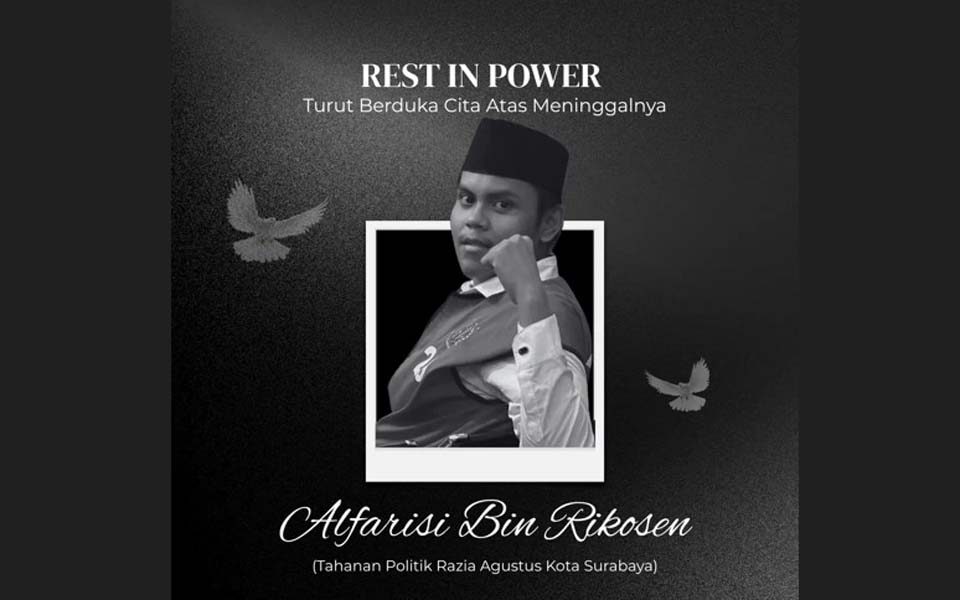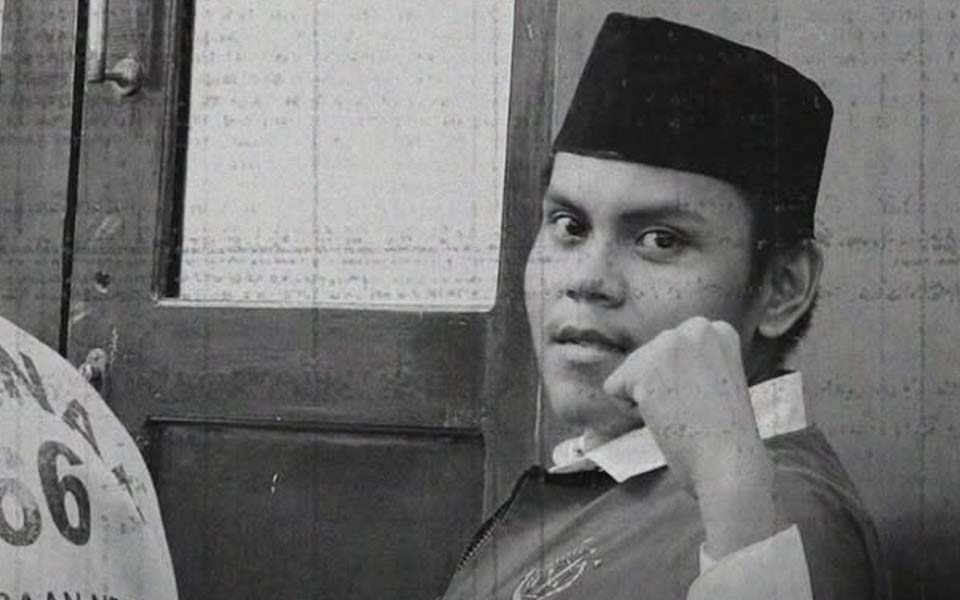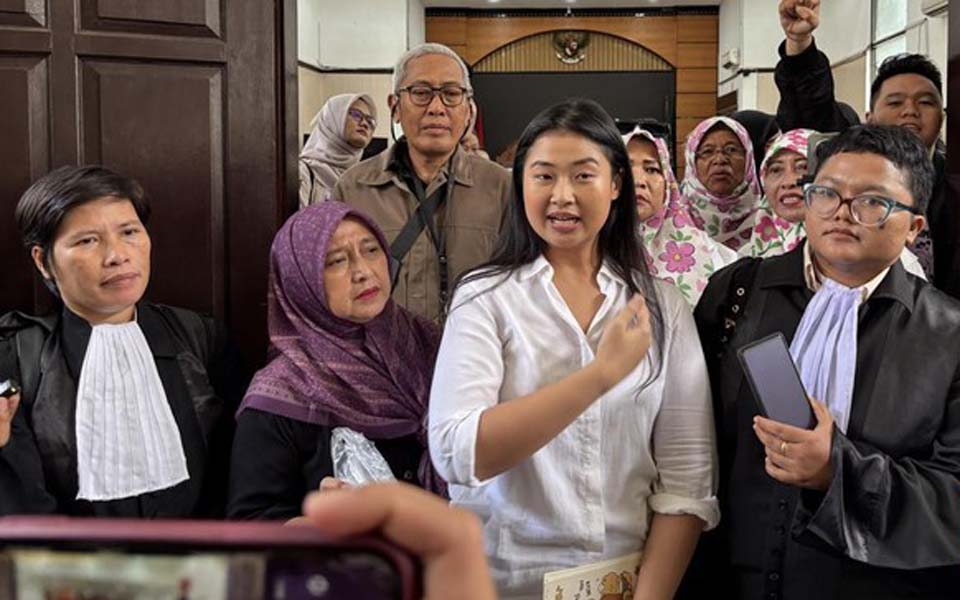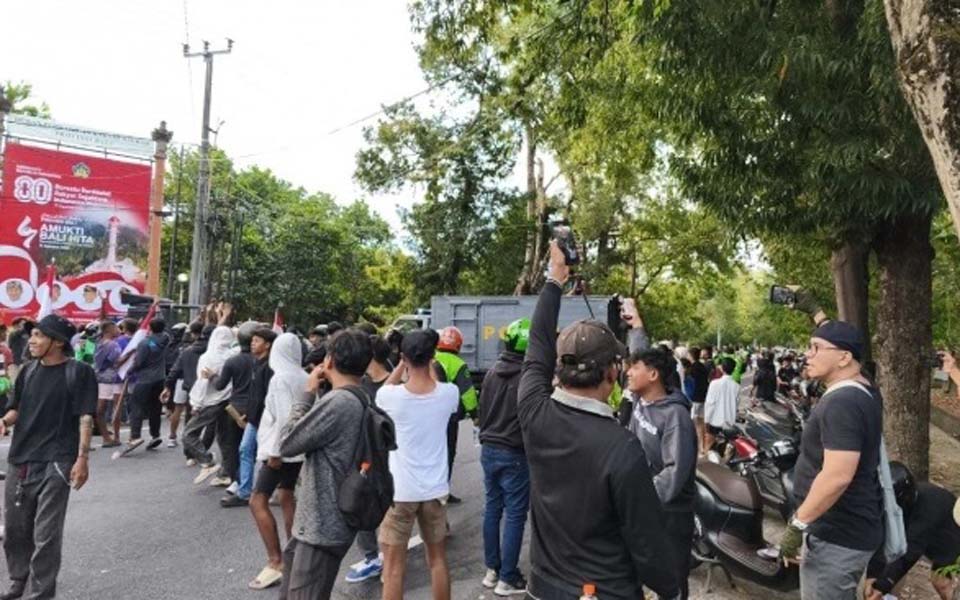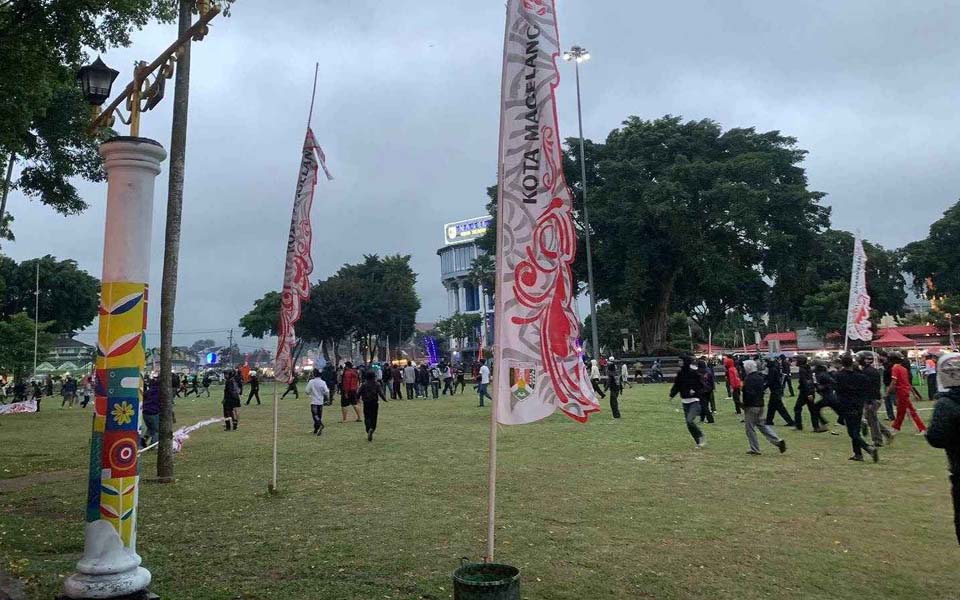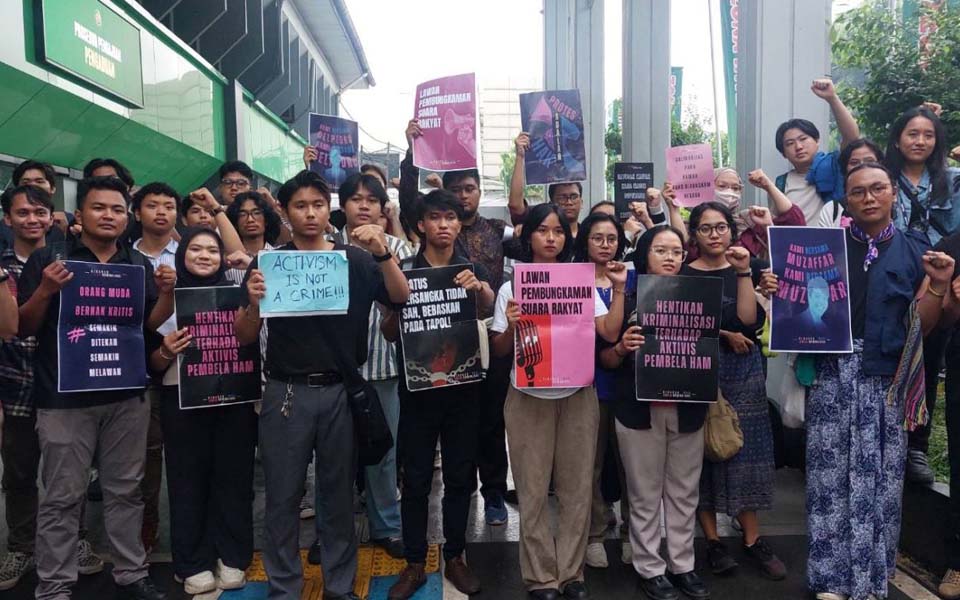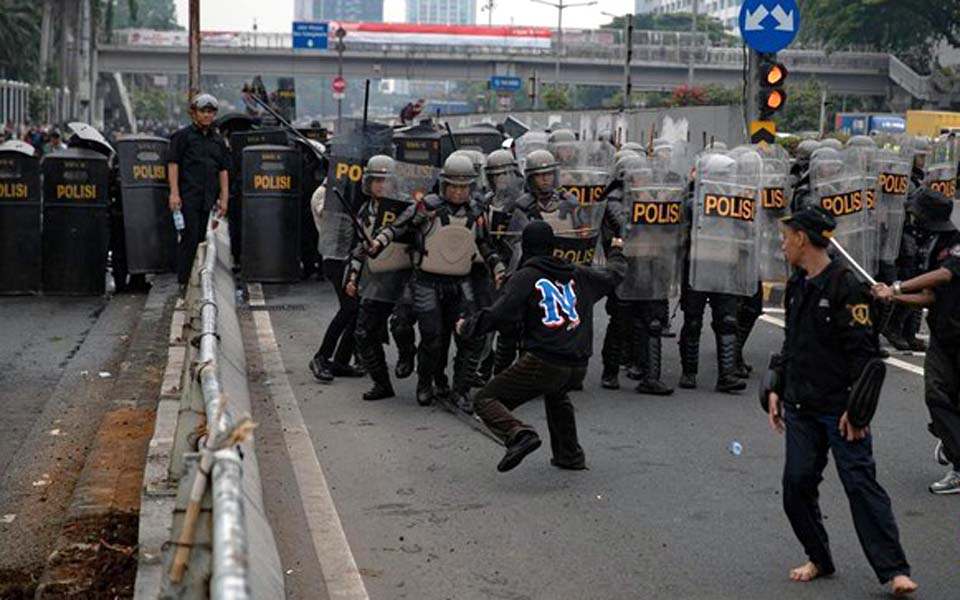Nearly a year into the regime of President Prabowo Subianto and Vice President Gibran Rakabuming Raka, mass resistance has erupted again. The underlying cause is the exploitative and oppressive policies of political elites, which have created a stark contrast between the political elite and the general public, as well as the systematic repression of various forms of resistance from the people.
The Prabowo-Gibran regime has successfully replicated former President Joko "Jokowi" Widodo’s triumph in consolidating the majority of existing political elite factions. The consolidation is achieved by dividing access to political power (read: positions) and the economy. Danantara (the sovereign wealth fund), which aims raise tens of trillions of rupiah, will be directed to three sectors: natural resource management, AI and digital development and food and energy security.
We can predict that political elites, particularly conglomerates will operating in the natural resources, AI and digital sectors and energy and food sectors, will soon be showered with Danantara money. Inevitably, it will generate substantial fees worth billions, even trillions – just by managing and handling these assets that can worth tens of trillions of rupiah.
This includes further strengthening the military as the strongest political elite faction in Indonesia since the 1965 tragedy. Unsurprisingly, amidst budget efficiency, the two ministries with the largest budgets are those responsible for repressing workers and the people. These are the Ministry of Defence (Kemhan) and the Indonesian Military (TNI) with a budget of Rp139.2 trillion, and the National Police (Polri) with a budget of Rp106 trillion. Furthermore, the new military-controlled agency, the National Nutrition Agency, has a budget of Rp71 trillion.
Currently, the military is involved in supporting the Free Nutritional Meals program (MBG/Makan Bergizi Gratis). The Indonesian Army is drafting plans to form 100 new battalions to support this program and other development initiatives. In a recent move, the Minister of State-Owned Enterprises recently appointed the active-duty military officer Major General Novi Helmy as President Director of the State Logistics Agency (Bulog). Bulog is tasked with a strategic role in procuring goods for the future MBG program.
Furthermore, in January, Prabowo held a meeting with two hundred selected military officers holding the rank of colonel. They attended a short course on management, business, finance, and investment, which focused on the food and energy sectors. These officers are being considered for positions in companies supported by the Ministry of Defence, state-owned enterprises (BUMN), and regionally-owned enterprises (BUMD). Plans also include doubling the number of territorial command structures.
The Prabowo-Gibran regime continues Jokowi's accelerated remilitarisation efforts. In general, Indonesia's political elites have a weak faith in democracy and are cowardly in confronting the military. The 1998 reformasi (the political reform process that began in 1998) or democratic transformation against militarism, was incomplete. Political elites, including the National Mandate Party (PAN), the Indonesian Democratic Party of Struggle (PDI-P), the National Awakening Party (PKB), the Justice and Prosperity Party (PKS) and others, betrayed the 1998 reformasi. The ABRI (Indonesian Armed Forces as it was known then) faction was abolished, but many other elements remained, from the territorial military commands to various military businesses and companies.
The strengthening of militarism also served to protect this policy of allocating power. Similarly, various new legal instruments were created to support it, such as the RKUHP (Draft Criminal Code), the RKUHAP (Draft Procedural Criminal Code), the RUU TNI (Draft TNI Law) and policies related to general elections. Meanwhile, various legal instruments were created to strengthen the distribution of economic power to political elites, such as the Omnibus Law on Job Creation Law the Mineral and Coal Mining Law (UU Minerba) and so on.
According to the Central Statistics Agency (Badan Pusat Statistik/BPS), as of March 2025 Indonesia's poverty rate has fall to just 8.47 percent representing 23.85 million people. The standardised calculation to accumulate on the national poverty line is less than 609,000 Indonesian rupiah per month – however, if measured with the World Bank's higher international poverty line of 1.51 million rupiah per month, the rate would surge around 68.3 percent which represent 194.72 million people.
Recently, there's been rising prices of essential goods such as food, transportation and education and without a corresponding increase in purchasing power. The changes in the labour system due to Job Creation law have also impacted on previously stable formal employment. BPS data indicates that more than 35 percent of the productive-age workers are currently working in the informal sector, where they experience minimal social security and uncertain incomes. Additionally, it was recorded that 42,385 people have lost their jobs during the first semester of Prabowo-Gibran regime (January-June). Evidently, it heightened social inequality, with the wealth of the richest 1 percent growing 17 times faster than the income of the bottom 50 percent.
The struggle to curb poverty, inequality and the suppression of democratic space is being waged by workers and the people. Various forms of resistances have arisen from people and labour organisations, yet they have been systematically suppressed. Movements such as Reform Corrupted, protests against the Jobs Law, the Emergency Warning (Peringatan Darurat) movement and movement against revisions to the TNI Law have all faced significant repression.
Large budgets for the Ministry of Defence and the National Police have further enhanced the TNI's territorial command structure and upgraded police equipment to suppress resistances and the ordinary people. Several recently issued policies have fuelled years of unrest.
In July-August 2025, the government raised Land and Building Taxes (PBB/Pajak Bumi Bangunan) various regions. This policy was implemented by unilaterally increasing the Taxable Object Sales Value (NJOP/Nilai Jual Objek Pajak) for properties that are owned by communities predominantly living in rural areas, namely farmers and local producers. The policy to increase the NJOP was enacted prior consultation between the people and the government as public civil servants. It was carried arbitrarily without considering the policy's impact on local economies.
Moreover, rumours have recently begun to surface about an increase in BPJS (Social Security Agency) contributions set to take effect in 2026. These so-called "fair and prosperous" health insurance premiums have skyrocketed corresponding with the declining economy. Since 2014, BPJS premiums have increased by 100-200 percent from the initial levels when BPJS was first established as a social security institution. Meanwhile complaints about the quality and accessibility of BPJS services remain unsolved.
On the other hand, the Indonesian government continues to tax the public and implement programs that have no positive impact – or even have a negative impact on the people. Take the MBG program for example – the food provided by the program to schoolchildren is often served in poor condition and frequently the food arrives spoiled.
As a result, many students and even teachers who consume the MBG program meals suffer from food poisoning. This issue is not isolated to just one region but it has been experienced in many areas. These cases demonstrates that government's programs for the people are completely ineffective. The government continues to use public funds to poison its own people.
This situation worsened during the plenary session commemorating Indonesia's 80th anniversary, when Prabowo announced an increase in the House of Representatives (DPR) allowances, raising their total monthly income to over Rp100 million. Even more absurd, other allowances were seemingly just "made up" – from communication allowances, rice allowances, housing allowances, assistant allowances, honorarium allowances, income tax allowances and even functional enhancement allowances. Public outrage intensified as the DPR's response, delivered by celebrities, mocked the plight of the people who are strangled and struggling under the weight of soaring taxes.
Protest after protest erupted continuously. August 13, Pati residents in Central Java held a large-scale movement, organised by the United Pati Community Alliance in front of the Padi regent's office. They demanded the cancellation of recently increased Rural and Urban Land and Building Tax (PBB-P2) and the removal of the regent. Tax protests then spread to other areas, with demonstrations occurring in Bone, Cirebon and Cianjur.
On August 25, protests began in major cities, primarily protesting high taxes and the privileges enjoyed by DPR members with demonstrations taking place in Jakarta, Medan, Pontianak and Surabaya.
On August 27 residents in Sorong, Papua, organised a demonstration at the Sorong Regional Police Headquarters. The TNI deployed 150 personnel, including two armoured vehicles to the protest site. Police sprayed the crowd with teargas. By the end of the demonstration, at least 12 residents were arrested and several demonstrators injured. Authorities also shot a motorcycle taxi driver who was inspecting the situation on Jalan Sudirman.
On August 28, protests resumed in Jakarta, with demonstrators attempting to occupy the DPR building. Police carried out mass arrests and assaults. Later that night, on Jalan Bendungan Hilir, a paramilitary police Mobile Brigade (Brimob) tactical vehicle with license plate 17713-VII drove through the crowd and ran over motorcycle taxi driver (ojol) Affan Kurniawan, who was attempting to cross the road. The murder of the martyr Kurniawan perpetrated by Brimob then spurred protests that spread to various regions around the country. These protests targeted government centres, particularly parliament buildings, but also regional police stations. With extraordinary courage, the people surrounded police stations, surrounded Brimob headquarters, and attacked them. Suppressed anger and repressed resistance exploded within a matter of hours. The protests continued, escalating and becoming more radical. Demands emerged for the removal of National Police Chief Listyo Sigit Prabowo.
In response to the growing anger of the masses, on August 29 Prabowo issued a public statement via the Presidential Secretariat's YouTube channel. In his statement, he expressed half-hearted condolences for Kurniawan's death – claiming that the root of the problem lay in "forced stability". Positioning himself as a "detached" observer, Prabowo did not acknowledge any mistakes during his leadership.
The Listyo Sigit meanwhile attempted to improve the police's image by visiting the families of the martyr killed by Brimob and apologising to the motorcycle taxi community and their families. However, the protesters disapproved of the statements. The demonstrations continued to spread, and grew increasingly radical. Several government centres, such as Regional House of Representative (DPRD) office and Gegana (police bomb squad) headquarters were burned down by mobs. The homes of political elites, particularly those associated with statements demeaning the people or implementing policies detrimental to them, were looted.
Soon after this President Prabowo coordinated with Listyo Sigit and TNI Commander General Agus Subiyanto in an August 30 public announcement calling for "firm action" against protestors. This was reinforced by Defence Minister Sjafrie Sjamsoeddin's statement on August 31 declaring that the TNI Commander, assisted by the Army, Navy and Air Force, would maintain "security" and safeguard "natural resources". The State Intelligence Agency (BIN/Badan Intelligent Negara) was tasked to monitoring and reporting to the president, which included authorising firm measure against demonstrators. Larger military deployments occurred in at least six cities: Jakarta, Bandung, Yogyakarta, Surabaya, Semarang and Makassar.
This military was the same one that had previously ruled for 32 years – a bloody reign riddled with corruption, collusion and nepotism. The military, alongside with the state ruling party Golkar and former president Suharto, formed the backbone of the New Order military dictatorship. In 1965, reactionary groups operating directly with the TNI, violently sabotaged progressive movements in Indonesia, reversing the entire process of nation-building. From 1996 to 1998, the Indonesian military systematically repressed and kidnapped pro-democracy activists. Today, we face a similar threat, with massive repression and murder perpetrated by state officials.
This military that has never been held accountable for all the crimes against humanity and the devastation it inflicted upon the nation. It is a military that, with its territorial command structure, has assaulted protesting workers, shot farmers that resists the seizure of their land, intimidated students on campus and orchestrated numerous racist riots.
On August 31, Prabowo Subianto held a meeting with the leaders of the People's Consultative Assembly (MPR), the DPR, the Regional Representatives Council (DPD) and all political parties with seats in the DPR. Prabowo asked the DPR leadership to open a dialogue with the public and ensure that the people do not lose trust in the government. He also stated that he would revoke several DPR policies, which included the controversial allowances for DPR members and a moratorium on overseas working visits. In the same statement however, he equated the ongoing demonstrations with terrorism.
The repression that ensued followed the same pattern that happened during the 2019 Reform Corrupted movement. Forcible dispersals, mass arrests, abuse and even murder were carried out against demonstrators. Journalists, ambulances, paramedics and medical centres were attacked and targeted. In the end, it shows that even a "pure and peaceful" protests, detached from "anarchist" elements, are not immune from repression.
On September 1, after visiting injured police officers at the Soekamto Police Hospital, Prabowo expressed his condolences to injured police officers – this time with a tone that was more sincere than his earlier expression to Kurniawan's family. Prabowo took concrete action by instructing Listyo Sigit to promote the injured the police officers. In the same statement, he warned that all demonstrations must obtain permits and end by 6 pm, and according to the perpetrator of human rights violation, this was the mechanism to ensure protests are conducted in "in accordance to the law" and represent what he classified as "correct" forms of expression.
That same evening, Lokataru Foundation activists Delpedro Marhaen and Syahdan Husein were arrested by police without any clear charges. Polices arrested Delpedro and Syahdan, confiscated material evidence and declared that Delpedro could face five years in prison. Concurrently, protests at the Pasundan University and Bandung Islamic University were violently dispersed with teargas resulting in 12 students falling unconscious.
While, it is unusual that any electricity and live streaming to be cut off and prohibited. The authorities imposed power blackouts, internet access was disrupted and banned the live streaming of protests.. The Indonesian Broadcasting Commission (KPI/Komisi Penyiaran Indonesia) instructed 66 television and radio stations to ban broadcasts covering violence perpetrated by the state security forces which included digital attacks against activists. As a result, at least seven people died and hospital records show that 1,042 people were injured – though the actual numbers were likely far higher as many arrests were accompanied by abuse. By August 31 approximately 3,337 people had been arrested including a Riau University student Khariq Anwar who was arrested on August 29.
The military played a role in this repression, although initially on a smaller scale. Although military tended to present themselves as a supporter of the people's struggle, or at least being neutral, or attempted to mediate between the police and the people. The commander of the Jakarta Military Command (Pangdam Jaya) visited the Brimob Headquarters in Jakarta with military escort. Some videos circulated on social media showing TNI soldiers and marines being welcomed with chants of "Long live the TNI". There was also a video depicting soldiers attempts to assist demonstrators – which mirrors similar incidents that occurred in Yogyakarta during the 2020 anti-Omnibus Law protest. However not all held such an attitude towards the military. Recently there has been a video depicting protesters, mostly University of Indonesia (UI) students, repeatedly shouting "Return to the barracks, now!".
The problematics of the movement
Very quickly, university students, vocational school students, youth, workers, motorcycle taxi drivers and others gained confidence that we, the ordinary people, can change the situation. After many years, the people's movement rose up again. The key to resolving all the issues faced by workers and the people lies in workers and the people believing in their own strength and ousting the political elite. And this process requires leadership and organisation.
During the initial explosion of spontaneous movements, it is quite common that not all groups or organisations immediately respond to the eruption that has occurred. Fundamentally, a spontaneous movement means that no group or organisation is orchestrating it. It may began as a simple action organised by certain groups then develops into a mass resistance, without anyone ever anticipating it.
The readiness and accuracy of a revolutionary organisation in responding to and leading such movement does not depend on its spontaneity but rather on the constructed historical character of that revolutionary organisation. Which includes the correctness of its program of struggle, its ideological perspective and the traditions of leadership cultivated within the organisation. If a revolutionary organisation is built on the basis of only promoting normative issues or simply participating in actions, it is will likely get trapped into merely following the steps of spontaneous movements. Likewise, if a revolutionary organisation becomes stuck only theoretical work without ever practicing leadership, it will struggle to provide leadership to spontaneous movements. It is precisely during this non-revolutionary period that the work of building a revolutionary organisation becomes crucial and important as it will be too late to build once a movement explodes, an uprising or revolutionary situation occurs.
By then, the revolutionary organisation must be in a state of readiness to launch actions at any moment. This is a situation where something that took years to build can drastically change in a few days or even hours. However, to be tactically flexible, one must truly possess what can be called tactics. Without a strong revolutionary organisation, tested in political struggle across all situations and times, it is impossible for a systematic action plan to be considered a tactic. Tactics must be guided by strong principles and executed steadfastly, qualities derived from a strong and tested revolutionary organisation.
Therefore, a leadership revolutionary organisation in spontaneous movement depends not only on the speed of intervention, but it also hinges on various aspects of the building of a revolutionary organisation itself – which later shapes its character as a revolutionary organisation.
As the class struggle intensifies, political differences that were previously less prominent become increasingly sharp. We can observe this recently with various political views emerging from different groups.
Said Iqbal, leader of the Labour Party, again attempted to divide the movement. This political elite figure, who is clearly aligned with the power of the human rights violators, issued a statement that actually divided the masses. In an interview with Tempo before a labour action at the DPR on August 27, he stated that non-workers, especially anarchists, should not join the demonstration.
Iqbal's alignment with the authorities was earlier displayed on May Day when he gave access to Prabowo to speak, hold hands and dance with workers. Iqbal's statement misdirect the blame away from the perpetrators of the violence. Workers themselves have repeatedly experienced violence by the political elite. The labour movement was destroyed by the New Order military regime and labour movements have been attacked, as seen in the history of Omah Buruh and Saung Buruh. In essence, the state of the political elite is a tool of violence against workers and the ordinary people. Meanwhile resistance against them, including the use of violence, is a method of struggle for the workers and the people.
Various groups often categorised as "civil society" – such as non-government organisations (NGOs) and several yellow trade unions, as well as students and the alumni of the Indonesian diaspora, have adopted a reformist stance against the current radicalisation of the people's movement. They hope that Prabowo, the DPR, the National Police and the TNI will remember that they represent the people's voice, that they obey the rule of law, stop repressive behaviour, demand transparency, accountability. Their rhetoric often culminates in intellectualised pleas ending with slogans like "We are waiting. Prove the people's voices are heard". These citizens or "civil society" actors seek change through strict adherence to the law and the rules set by political elite.
Such efforts to remind political elites like Prabowo and arrogant members of the DPR only strengthens the position of those very elites. This lack of firmness and the mistaken belief in relying state institutions ultimately weaken the power of the masses. From the beginning, these elites have never considered policies that benefit workers and the people. Therefore, the next question is, why do they still rely on the political elite and force the masses to depend on their oppressors?
They overlook the long-standing reality that this is a struggle between the political elite and the workers and the ordinary people. This is a clear case of "us versus them". They sabotaged the workers' and people's movements in the 1965 tragedy, oppressed us during the Military Operational Area (DOM) in Aceh and Papua, invaded and occupied East Timor, kidnapped us in 1998, and incited racism against the Chinese, Timorese and Papuans, etc.. Meanwhile, we responded with the 1998 reformasi, overthrowing Suharto and ending the 32-year New Order military regime, and yet they stole it again from us.
Then, another emerging slogan is "Reset Indonesia". There's no clear reason why this term was chosen. By definition, "reset" means resetting or returning something to its original state or initial state. What initial state is being referred to? There's no explanation given. Returning to an initial state assumes that the existing system is fundamentally sounds good.
This does indeed represent basic division within the movement, even since the inception of the movement, with regards to the vision of Indonesia's future. Some groups believe that the current (or at that time) system is fundamentally good, requiring only certain improvements. Meanwhile, others believe that the current system, capitalism, is fundamentally corrupt and a new system is needed, which we believe is socialism.
To achieve socialism, we need to open democratic space as widely as possible. This includes building a new system of power that allows for the involvement of workers and the people and democratisation in the economic sector, namely the control of strategic assets in the hands of workers and the people so that they can be used to the greatest extent for the people's prosperity.
We have experienced 27 years of the 1998 reformasi. We have seen and experienced firsthand what happens when changes fails to address the fundamental nature of the system itself. We have witnessed the consequences of power remaining in the hands of political elites. We have witness how the power is wielded under the political elites.
We must never forget that the democracy and prosperity negotiated in statements at the tables of parliament and the State Palace were painful for workers and the people. It was painful for Kurniawan, terrifying for assassinated rights activist Munir, horrifying for murdered labour activist Marsinah, terrible for underpaid workers, traumatising for farmers whose land was seized, painful for all of us, workers and the people. Never forget that democracy is of the people, for the people, and by the people. The people are now exercising that democracy by taking to the streets to reclaim what has been stolen, to end all forms of oppression, and to heal all the pain inflicted when power was rested in the hands of political elites.
Our call and demands
Amidst the struggle, including the crackdown by the Prabowo-Gibran regime, we must continue to push for the strengthening and leadership of workers and the people. The current spontaneous actions must be given an organised and directed purpose. The steps that workers and the people must take are:
1. Forming Resistance Committees. Establish Resistance Committees in every corner of campuses, villages and factories. These Resistance Committees are tasked with continuing to wage resistance against the political elite. They launch actions, strikes, occupations and also became educational centres by holding mass meetings, political education sessions, discussions and so on. These Resistance Committees would also coordinate logistics to support all workers' and people's struggles.
2. From Committees to People's Power! As they grow, these Resistance Committees will become the embryo of the people's own power – ready to replace the corrupt state institutions of today's political elite.
3. Occupy! Mobilise! Rise! Take over campuses, factories and centres of power! Carry forward the struggle, unleash a nationwide action across Indonesia!
Action committees function as machines for the masses to exert working-class pressure on the government. It is within these committees that ideological work is carried out, discussions on current issues are held and the void of left by depoliticised movement is filled. We already know that the DPR, formally declared representatives of the people, does not worked at all on behalf of workers and the people. The masses themselves can be the driving force for change, representing their own political interests. Resistance committees consist of representatives of those involved in launching strikes and actions, who will later independently organise themselves – which constitutes an embryonic organ of workers' power.
By building political consciousness and correct alignments, these committees will be able to address the needs of the masses, including miraging looting and the growth of racism. In our struggle, workers and the people must reject all attempts to sow discord and divide them, especially on racist or religious issues often used by the military. We must reject acts of mass looting against fellow citizens. Racist issues against ethnic Chinese, Eastern Indonesians, Papuans or religions, which will divert us from our main enemy, the political elite, and turn it into a conflict among the people themselves.
Nine demands of the workers and people to be fought for until we win:
1. Abolish privileges! Slash the bloated salaries of state officials, generals, agency heads, commissioners and directors of state-owned enterprises – bring them down to the level of the average wage! Redirect the stolen wealth to free education, free healthcare, public subsidies and the welfare of workers and the people.
2. Cut the budgets of useless ministries and institutions that serve power, not the people – including the Ministry of Defence, the police, the Attorney General's Office, BIN, the DPR and the MPR! Channel every rupiah into free education, free healthcare, public subsidies and the welfare of workers and the people.
3. Raise workers' wages! Cut the people's taxes!
4. Make the corporations, banks and conglomerates pay – impose heavy progressive taxes on their obscene profits!
5. Free our comrades now – unconditionally!
6. Arrest, prosecute and jail the butchers and officials guilty of human rights crimes!
7. Slash the budget and disarm the National Police along with every repressive tool of the Prabowo-Gibran regime!
8. The military back to the barracks – end military interference in civilian life!
9. Seize all the assets of corruptors and tax-dodging conglomerates, and return them to the people through free education, free healthcare, public subsidies and the welfare of workers and the people!
As with previous struggles – including the 1998 reformasi – rumours have emerged suggesting that the movement is being exploited, or at least influenced by, the interests of certain political elite factions or even foreign imperialist itself. The Prabowo-Gibran regime and other political elites have propagated narratives claiming "foreign actors", as alleged by former BIN chief A.M. Hendropriyono, or "corruptors" and "mafia" as stated by Prabowo are behind the protest
For instance, a report by the Russian media outlet Sputnik suggested two possible external actors involved in the current protest including the National Endowment for Democracy (NED), which it claims has funded Indonesian media since the 1990s, and George Soros's Open Society Foundations, which has over $8 billion in assets worldwide and supports groups like the Tifa Foundation. Within the movement itself, similar concerns often arise, such as a fear of advancing the movement too forcefully as it may be accused of aligning with existing political elite factions.
Indeed, we must not be naive and assume that the political elites, regardless of faction, or even imperialist forces, regardless of country, will simply sit idly by. They will do everything in their power to ensure the movement aligns with their own interests, from outright massive repression to exploiting labour and co-opting the people's movements. This exploitation can be achieved through propaganda in the mass media and through the infiltration of organisations and mass demonstrations. To some extent, they may benefit from the struggle for democratisation. For example, regional political elites rejoiced over the 1998 reformasi because it created opportunities for them to gain power in the regions after the fall of Suharto's centralised militaristic regime.
The 1998 reformasi also demonstrated a similar trend: political elites, particularly those "outside" the New Order military regime, jostled for power by exploiting the 1998 reformasi for their own gain. However, the struggle for democratisation ultimately benefits workers and the people. The more complete the struggle, the stronger the workers and the people in confronting the political elites. While, the political elites will consistently uphold the historical waste such as militarism.
The political elite will benefit if the struggle remains incomplete and fails to open up democratic space as broadly as possible. If the movement is restrained, they gain more advantages from changes that are slow, gradual, cautious, moderate and avoiding mass mobilisation. And it would be especially beneficial for the political elite if the changes developed as little as possible the power of workers and the people, involved as little as possible the workers and the people and gave rise to as little initiative or power from the workers and the people as possible. Because if that happens, the power of workers and the people can attack the political elites themselves. Just look at the resolution of the 1998 reformasi through the Ciganjur Declaration, the gradual abolition of the ABRI's dual socio-political function (dwi-fungsi) and the democratisation carried out through elections, parliament and the military, which were the remnants of the New Order military regime. Painful? For workers and the people, of course.
Politics is a battlefield, a conflict of "them versus us" with irreconcilable interest. Our struggle, our program, demands and methods must clearly and unequivocally reflect the interests of workers and the people. Only this clarity can prevent that the workers' and people's movement not being exploited by or demarcated by political elites or imperialist forces. Moderate demands, those dreams of change and adherence to the laws and regulations made by the political elites, only open the door for workers and people to be exploited by the political elites. Remember that the political elites will not only exploit them but now we are already seeing the backlash.
The nine demands of the workers and people can be achieved through the unity of the workers and people along with the trade union leadership. This includes unleashing the primary and most powerful weapon of the working class and people: strikes. The initial step to this is the establishment of Resistance Committees in every mass base.
[Translated by Arah Juang, edited by James Balowski. The original Indonesian language version "Rakyat Dicekik Pajak! Hak Istimewa Elit Politik Melangit! Ganyang Para Elit Politik!" can be accessed here: https://www.arahjuang.com/2025/09/03/rakyat-dicekik-pajak-hak-istimewa-elit-politik-melangit-ganyang-para-elit-politik/.]






